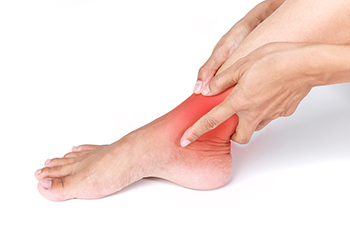What Is Causing My Ankle Pain?
Tuesday, 21 September 2021 00:00 The ankle joint is designed to support the whole body through a complex network of bones, muscles, cartilage, ligaments and tendons. Injury or disease to any one of these parts can be debilitating. One of the most common forms of ankle pain is from an ankle sprain. Ankle sprains often occur from stepping on an uneven surface or from a sporting accident that causes the ligaments connecting the bones to become partially or completely torn. Tendonitis is another common cause of ankle pain. Tendonitis occurs when the tendons, which connect the muscles to the bones, become inflamed. Arthritis, which occurs when joints become inflamed, can also lead to ankle pain. There are a variety of other sources of ankle pain, and patients who notice pain in their ankle should consult with a podiatrist for a proper diagnosis and treatment.
The ankle joint is designed to support the whole body through a complex network of bones, muscles, cartilage, ligaments and tendons. Injury or disease to any one of these parts can be debilitating. One of the most common forms of ankle pain is from an ankle sprain. Ankle sprains often occur from stepping on an uneven surface or from a sporting accident that causes the ligaments connecting the bones to become partially or completely torn. Tendonitis is another common cause of ankle pain. Tendonitis occurs when the tendons, which connect the muscles to the bones, become inflamed. Arthritis, which occurs when joints become inflamed, can also lead to ankle pain. There are a variety of other sources of ankle pain, and patients who notice pain in their ankle should consult with a podiatrist for a proper diagnosis and treatment.
Ankle pain can be caused by a number of problems and may be potentially serious. If you have ankle pain, consult with Dr. Kirk Sherris from Liberty Bay Foot & Ankle. Our doctor will assess your condition and provide you with quality foot and ankle treatment.
Ankle pain is any condition that causes pain in the ankle. Due to the fact that the ankle consists of tendons, muscles, bones, and ligaments, ankle pain can come from a number of different conditions.
Causes
The most common causes of ankle pain include:
- Types of arthritis (rheumatoid, osteoarthritis, and gout)
- Ankle sprains
- Broken ankles
- Achilles tendinitis
- Achilles tendon rupture
- Stress fractures
- Bursitis
- Tarsal tunnel syndrome
- Plantar fasciitis
Symptoms
Symptoms of ankle injury vary based upon the condition. Pain may include general pain and discomfort, swelling, aching, redness, bruising, burning or stabbing sensations, and/or loss of sensation.
Diagnosis
Due to the wide variety of potential causes of ankle pain, podiatrists will utilize a number of different methods to properly diagnose ankle pain. This can include asking for personal and family medical histories and of any recent injuries. Further diagnosis may include sensation tests, a physical examination, and potentially x-rays or other imaging tests.
Treatment
Just as the range of causes varies widely, so do treatments. Some more common treatments are rest, ice packs, keeping pressure off the foot, orthotics and braces, medication for inflammation and pain, and surgery.
If you have any questions, please feel free to contact our office located in Poulsbo, WA . We offer the newest diagnostic and treatment technologies for all your foot care needs.







